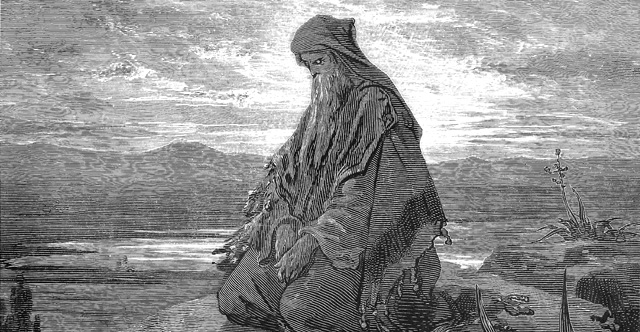
1
“
Where has your loved one gone, O most beautiful among women? Where has your loved one turned, that we may look for him with you?” The Woman
Para onde foi o teu amado, ó tu, a mais formosa entre as mulheres? para onde se retirou o teu amado, a fim de que o busquemos juntamente contigo?
2
“
My love has gone down to his garden, to the beds of spices. He has gone to feed his flock in the gardens and to gather lilies.
O meu amado desceu ao seu jardim, aos canteiros de bálsamo, para apascentar o rebanho nos jardins e para colher os lírios.
3
I
am my love’s, and my love is mine, he who feeds his flock among the lilies.” The Fifth Song King Solomon
Eu sou do meu amado, e o meu amado é meu; ele apascenta o rebanho entre os lírios.
4
“
You are as beautiful as Tirzah, my love, as beautiful as Jerusalem. You are to be feared as an army with flags.
Formosa és, amada minha, como Tirza, aprazível como Jerusalém, imponente como um exército com bandeiras.
5
T
urn your eyes away from me, for they trouble me. Your hair is like a flock of goats that has come down from Gilead.
Desvia de mim os teus olhos, porque eles me perturbam. O teu cabelo é como o rebanho de cabras que descem pelas colinas de Gileade.
6
Y
our teeth are like a flock of sheep which has come up from the washing. All of them give birth to two lambs at a time, and not one of them has lost her young.
Os teus dentes são como o rebanho de ovelhas que sobem do lavadouro, e das quais cada uma tem gêmeos, e nenhuma delas é desfilhada.
7
T
he sides of your forehead are like a piece of a pomegranate behind your face-covering.
As tuas faces são como as metades de uma romã, por detrás do teu véu.
8
T
here are sixty queens, and eighty women kept who act like wives, and there are too many young women to number who have never had a man.
Há sessenta rainhas, oitenta concubinas, e virgens sem número.
9
B
ut my dove, my perfect one, is special. She is her mother’s only daughter. She is the pure child of the one who gave birth to her. The young women saw her and knew she was honored. The queens and the women who act as wives praised her, saying,
Mas uma só é a minha pomba, a minha imaculada; ela e a única de sua mãe, a escolhida da que a deu ã luz. As filhas viram-na e lhe chamaram bem-aventurada; viram-na as rainhas e as concubinas, e louvaram-na.
10
‘
Who is this that looks out like the first light of day? She is as beautiful as the full moon, as pure as the sun. She is to be feared as an army with flags.’” The Woman
Quem é esta que aparece como a alva do dia, formosa como a lua, brilhante como o sol, imponente como um exército com bandeiras?
11
“
I went down to the field of nut trees to see the flowers of the valley, to see if the vines or the pomegranates had flowers.
Desci ao jardim das nogueiras, para ver os renovos do vale, para ver se floresciam as vides e se as romanzeiras estavam em flor.
12
B
efore I knew it, I wanted to be over the war-wagons of the princes of my people.” Women of Jerusalem
Antes de eu o sentir, pôs-me a minha alma nos carros do meu nobre povo.
13
“
Return, return, O Shulammite! Return, return, that we may look upon you!” The Woman “Why should you look upon the Shulammite, as upon a dance in front of two armies?”
Volta, volta, ó Sulamita; volta, volta, para que nós te vejamos. Por que quereis olhar para a Sulamita como para a dança de Maanaim?
 English
English
 Albanian - Shqip
Albanian - Shqip
 Arabic - العربية
Arabic - العربية
 Bulgarian - Български
Bulgarian - Български
 Chinese - 汉语
Chinese - 汉语
 English - English
English - English
 French - Français
French - Français
 German - Deutsch
German - Deutsch
 Italian - Italiano
Italian - Italiano
 Māori - Te Reo Māori
Māori - Te Reo Māori
 Portuguese - Português
Portuguese - Português
 Romanian - Română
Romanian - Română
 Russian - Русский
Russian - Русский
 Somali - Af Soomaali
Somali - Af Soomaali
 Spanish - Español
Spanish - Español
 Ukrainian - Українська
Ukrainian - Українська
 Vietnamese - Tiêng Viêt
Vietnamese - Tiêng Viêt
 Portuguese
Portuguese
 Albanian - Shqip
Albanian - Shqip
 Arabic - العربية
Arabic - العربية
 Bulgarian - Български
Bulgarian - Български
 Chinese - 汉语
Chinese - 汉语
 English - English
English - English
 French - Français
French - Français
 German - Deutsch
German - Deutsch
 Italian - Italiano
Italian - Italiano
 Māori - Te Reo Māori
Māori - Te Reo Māori
 Portuguese - Português
Portuguese - Português
 Romanian - Română
Romanian - Română
 Russian - Русский
Russian - Русский
 Somali - Af Soomaali
Somali - Af Soomaali
 Spanish - Español
Spanish - Español
 Ukrainian - Українська
Ukrainian - Українська
 Vietnamese - Tiêng Viêt
Vietnamese - Tiêng Viêt
